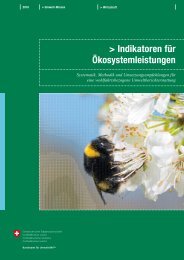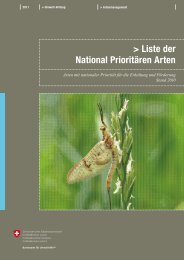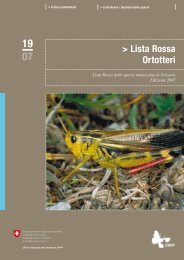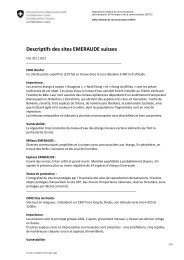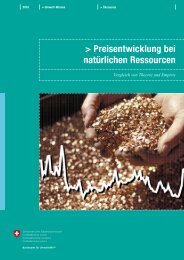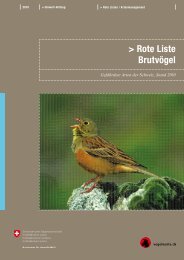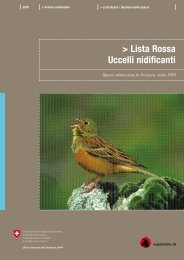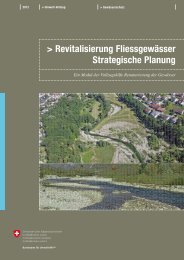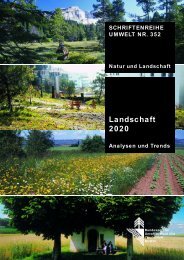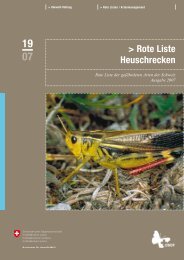Invasive alien species in Switzerland - Schweizer ...
Invasive alien species in Switzerland - Schweizer ...
Invasive alien species in Switzerland - Schweizer ...
Create successful ePaper yourself
Turn your PDF publications into a flip-book with our unique Google optimized e-Paper software.
An <strong>in</strong>ventory of <strong>alien</strong> <strong>species</strong> and their threat to biodiversity and economy <strong>in</strong> <strong>Switzerland</strong> FOEN 2006 110<br />
In particular, we recommend an assessment of <strong>alien</strong> spiders <strong>in</strong> greenhouses and other<br />
heated build<strong>in</strong>gs. Greenhouses <strong>in</strong> nurseries and garden centres are the most likely to be<br />
colonized by <strong>alien</strong> spider <strong>species</strong>, and from there these can be spread to households on<br />
plant material (e.g. Eperigone eschatologica). Research and monitor<strong>in</strong>g are needed,<br />
because of the potential economic impact of some <strong>species</strong>. The first encounter with<br />
Uloborus plumipes is an example: a nursery started an <strong>in</strong>quiry to f<strong>in</strong>d out what <strong>species</strong><br />
had <strong>in</strong>fested their property after this spider had covered all plants with webs, so that<br />
plants became difficult to sell. Moreover, the possibility of accidental <strong>in</strong>troductions of<br />
poisonous spiders should not be underrated. Nurseries would be the ma<strong>in</strong> targets for<br />
these monitor<strong>in</strong>g programmes, but other heated build<strong>in</strong>gs <strong>in</strong> botanical gardens and zoos<br />
should be <strong>in</strong>cluded.<br />
The follow<strong>in</strong>g are considered to have the greatest potential for economic impacts:<br />
> Mass outbreaks of nuisance <strong>species</strong> (see Ostearius melanopygius), but without<br />
caus<strong>in</strong>g real damage.<br />
> A dramatic <strong>in</strong>crease <strong>in</strong> the population of the wall-<strong>in</strong>habit<strong>in</strong>g spider Dictyna civica.<br />
> The potential medical costs for treatments of bites of <strong>in</strong>troduced poisonous spiders,<br />
see ‘banana spiders’, and escaped terrarium <strong>species</strong>.<br />
Hav<strong>in</strong>g noted the potential threats to humans, it has to be stressed that broad use of<br />
pesticides aga<strong>in</strong>st spiders is not a reasonable reaction, because of the non-target effects<br />
of these chemicals and the fact that publicity of such measures will exaggerate arachnophobia,<br />
already well-grounded <strong>in</strong> the human population.<br />
In conclusion, only a very small number of spiders and their relatives are considered as<br />
problem <strong>species</strong> on a global scale, <strong>in</strong>clud<strong>in</strong>g Central Europe (e.g. Welch et al., 2001 do<br />
not list any <strong>alien</strong> spiders for Scotland). A reasonable explanation could be that many<br />
phytophagous <strong>in</strong>sects live <strong>in</strong> closer association with their host plants, e.g. eggs, larvae<br />
and pupae are firmly attached to host plants or <strong>in</strong>side them. This would facilitate their<br />
transport with plant material. Another factor is that spiders with their predatory behaviour<br />
are less obvious than phytophagous <strong>in</strong>sects that damage their host plants. Moreover,<br />
as po<strong>in</strong>ted out earlier, the group is rather neglected and many <strong>in</strong>formation gaps<br />
still exist. However, after successful <strong>in</strong>troduction <strong>in</strong>to a new area, many spiders are<br />
highly capable of a rapid expansion <strong>in</strong> range either by natural means such as balloon<strong>in</strong>g<br />
or by hitch<strong>in</strong>g a ride on vehicles.



